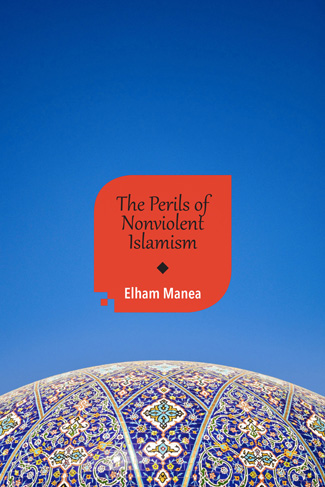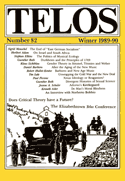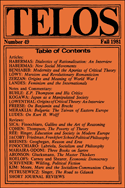By The Telos-Paul Piccone Institute · Tuesday, February 20, 2024  The third webinar in the Telos-Paul Piccone Institute’s yearlong series reckoning with the response to October 7 will take place on Thursday, March 7, 2024, at noon Eastern Time. The third webinar in the Telos-Paul Piccone Institute’s yearlong series reckoning with the response to October 7 will take place on Thursday, March 7, 2024, at noon Eastern Time.
Click here to register for the event.
All subsequent panels are likewise scheduled for noon Eastern Time on the seventh day of each month. Panels will run between 90 to 120 minutes, followed by a colloquy among the panelists and audience Q&A.
Our third webinar considers feminist perspectives on sex and violence in the Israel–Hamas conflict. Our panelists are Mariam Memarsadeghi and Batya Ungar-Sargon. Our respondent is Nina Power.
Continue reading →
By Saladdin Ahmed · Monday, October 3, 2022 On September 16, 2022, Mahsa Amini, a twenty-two-year-old Kurdish woman, died in captivity three days after she was abducted by “morality police” in Tehran for allegedly breaking the dress code imposed by the Iranian ruling regime. Almost immediately protests broke out across the country. As of the time of writing these lines, a week after Mahsa Amini’s death, the popular protests are only intensifying and thereby insisting on the revolutionary event-ness (per Badiou) of the historical moment. What instigated the protests is not the exceptionality of the incident but rather the commonality of what it represents in terms of legalized violence against the doubly and triply marginalized.
In all societies that live under oppressive regimes, revolt takes place regularly and in various individual and collective forms. Once in a while, an incident would have a domino effect triggering a simultaneous, unplanned, popular uprising that overwhelms the police apparatuses for a few days, weeks, or more. Sometimes the protested regime would not get a chance to resume its totalitarian grip on power, which may result in the ultimate collapse of the police state altogether. While the Arab Spring movements successfully brought down several oppressive regimes, the Islamist movements hijacked almost every popular uprising, which resulted in widespread disbelief in the democratic plausibility and strategic effectiveness of uprisings. However, what happened in the Arab Spring is something Iranians already experienced in the 1979 revolution when Khomeini’s followers hijacked the revolution. While this Iranian uprising, like the uprisings of the Arab Spring, might suffer from the absence of a revolutionary agenda for establishing a new social and political order, it will nonetheless be immune to at least one type of counterrevolutionary infection, which is Islamism. This protest movement’s spontaneous adoption of the Rojava-Bakur revolution’s motto, “Jin, Jiyan, Azadi,” “Women, Life, Freedom,” is a promising sign in terms of the prospects of moving beyond not only religious fundamentalism but also other forms of male-chauvinism and nationalism.
Continue reading →
By Telos Press · Thursday, March 11, 2021 To read more in depth from Telos, subscribe to the journal here.
Writing in the Wall Street Journal, Tunku Varadarajan talks with Elham Manea about Switzerland’s recent decision to prohibit the wearing of full facial coverings in public, thereby restricting the burqa and the niqab. Manea’s new book The Perils of Nonviolent Islamism, which investigates the broader context of this decision in comprehensive detail, is now available from Telos Press in our online store for 20% off the list price.
An excerpt from the article:
 European democracies differ from America’s in notable ways, and many Americans have reservations about the Swiss prohibition: Aren’t burqa bans an illiberal curbing of religious and expressive freedom? By some reports, fewer than 100 women in Switzerland wear the burqa. Do they constitute so great a threat to the venerable Swiss nation that their constitution, which guarantees freedom of faith and conscience, has to be amended to alter their sartorial practice? European democracies differ from America’s in notable ways, and many Americans have reservations about the Swiss prohibition: Aren’t burqa bans an illiberal curbing of religious and expressive freedom? By some reports, fewer than 100 women in Switzerland wear the burqa. Do they constitute so great a threat to the venerable Swiss nation that their constitution, which guarantees freedom of faith and conscience, has to be amended to alter their sartorial practice?
Aware that judgments from afar can sometimes be glib, I put these questions to Elham Manea, author of a book published last month titled The Perils of Nonviolent Islamism. . . . Ms. Manea is quick to dismiss the argument that the ban curbs freedom. You can’t separate the burqa and niqab from their “religious and political contexts” and turn this into “a simple question of ‘choice.'” The burqa didn’t “come out of nowhere” and Muslim women haven’t “decided to embrace it on a whim.” Many Western feminists, she says, tend to “neutralize the context, as if it is of no consequence.” She urges those who are squeamish about the ban to ask which ideology teaches women to cover themselves completely. What are its theological features? What does it say about women?
Continue reading →
By Arno Tausch · Wednesday, April 19, 2017 This article develops new empirical perspectives on the growing gender policy and gender role clash of civilizations now looming ahead in Western countries. The very same European governments that welcomed hundreds of thousands of migrants from countries with what the Muslim feminist Ziba Mir-Hosseini called “compulsory dress codes, gender segregation, and the revival of cruel punishments and outdated patriarchal and tribal models of social relations,” are untiringly promoting gender mainstreaming, which is now a top priority for European Union policymakers. Western feminism is at a turning point. Will it share with large sections of the green and left political currents in the West the cowardly silence about the threat of Islamist totalitarianism and terrorism, or will it develop solidarity with Muslim feminism?
Continue reading →
By Maja Sidzinska · Tuesday, February 5, 2013 As an occasional feature on TELOSscope, we highlight a past Telos article whose critical insights continue to illuminate our thinking and challenge our assumptions. Today, Maja Sidzinska looks at Guenther Roth’s “Durkheim and the Principles of 1789: The Issue of Gender Equality,” from Telos 82 (Winter 1989).
 Guenther Roth positively establishes that the principles of 1789—liberté, egalité, fraternité—have been overridden by Émile Durkheim’s essentializing gender prescriptions in the service of social stability. He shows that mutually exclusive and unequal gender roles were central to Durkheim’s theory of organic solidarity. But Roth’s examination does more than just explain theoretical contradictions present in Durkheim’s work. His inquiry invites new investigations into Durkheim’s gender politics, the most intriguing one provoked by his comparative treatment of Durkheim’s and Marianne Weber’s perspectives on marriage and divorce. These contemporaries shared a political outlook yet diverged greatly in their ultimate directives for society. Guenther Roth positively establishes that the principles of 1789—liberté, egalité, fraternité—have been overridden by Émile Durkheim’s essentializing gender prescriptions in the service of social stability. He shows that mutually exclusive and unequal gender roles were central to Durkheim’s theory of organic solidarity. But Roth’s examination does more than just explain theoretical contradictions present in Durkheim’s work. His inquiry invites new investigations into Durkheim’s gender politics, the most intriguing one provoked by his comparative treatment of Durkheim’s and Marianne Weber’s perspectives on marriage and divorce. These contemporaries shared a political outlook yet diverged greatly in their ultimate directives for society.
Continue reading →
By Maja Sidzinska · Tuesday, November 20, 2012 As an occasional feature on TELOSscope, we highlight a past Telos article whose critical insights continue to illuminate our thinking and challenge our assumptions. Today, Maja Sidzinska looks at Joan Landes’s “Feminism and the Internationals” from Telos 49 (Fall 1981).
 Although 2012 is being hailed as the new Year of the Woman and women’s votes were solicited and cited as pivotal to the outcome of the U.S. presidential election, Joan Landes’s 1981 article “Feminism and the Internationals” provides a timely reminder about the strategic ways that women’s and feminist movements have been deployed in service of political agendas in body politics past. Landes illustrates the historical subordination of women’s and feminist concerns in socialist paradigms and states, shows that the personal was treated as apolitical, and alludes to male epistemic authority as begetting these developments. From the vantage point of Marxist socialism, the problem with feminism is that it undermines the unified class struggle by introducing a competing concern—gender—that threatens the cohesion of the socialist movement. Although 2012 is being hailed as the new Year of the Woman and women’s votes were solicited and cited as pivotal to the outcome of the U.S. presidential election, Joan Landes’s 1981 article “Feminism and the Internationals” provides a timely reminder about the strategic ways that women’s and feminist movements have been deployed in service of political agendas in body politics past. Landes illustrates the historical subordination of women’s and feminist concerns in socialist paradigms and states, shows that the personal was treated as apolitical, and alludes to male epistemic authority as begetting these developments. From the vantage point of Marxist socialism, the problem with feminism is that it undermines the unified class struggle by introducing a competing concern—gender—that threatens the cohesion of the socialist movement.
Continue reading →
|
|
 The third webinar in the Telos-Paul Piccone Institute’s yearlong series reckoning with the response to October 7 will take place on Thursday, March 7, 2024, at noon Eastern Time.
The third webinar in the Telos-Paul Piccone Institute’s yearlong series reckoning with the response to October 7 will take place on Thursday, March 7, 2024, at noon Eastern Time. 
 Guenther Roth positively establishes that the principles of 1789—liberté, egalité, fraternité—have been overridden by Émile Durkheim’s essentializing gender prescriptions in the service of social stability. He shows that mutually exclusive and unequal gender roles were central to Durkheim’s theory of organic solidarity. But Roth’s examination does more than just explain theoretical contradictions present in Durkheim’s work. His inquiry invites new investigations into Durkheim’s gender politics, the most intriguing one provoked by his comparative treatment of Durkheim’s and Marianne Weber’s perspectives on marriage and divorce. These contemporaries shared a political outlook yet diverged greatly in their ultimate directives for society.
Guenther Roth positively establishes that the principles of 1789—liberté, egalité, fraternité—have been overridden by Émile Durkheim’s essentializing gender prescriptions in the service of social stability. He shows that mutually exclusive and unequal gender roles were central to Durkheim’s theory of organic solidarity. But Roth’s examination does more than just explain theoretical contradictions present in Durkheim’s work. His inquiry invites new investigations into Durkheim’s gender politics, the most intriguing one provoked by his comparative treatment of Durkheim’s and Marianne Weber’s perspectives on marriage and divorce. These contemporaries shared a political outlook yet diverged greatly in their ultimate directives for society.  Although 2012 is being hailed as the new Year of the Woman and women’s votes were solicited and cited as pivotal to the outcome of the U.S. presidential election, Joan Landes’s 1981 article “Feminism and the Internationals” provides a timely reminder about the strategic ways that women’s and feminist movements have been deployed in service of political agendas in body politics past. Landes illustrates the historical subordination of women’s and feminist concerns in socialist paradigms and states, shows that the personal was treated as apolitical, and alludes to male epistemic authority as begetting these developments. From the vantage point of Marxist socialism, the problem with feminism is that it undermines the unified class struggle by introducing a competing concern—gender—that threatens the cohesion of the socialist movement.
Although 2012 is being hailed as the new Year of the Woman and women’s votes were solicited and cited as pivotal to the outcome of the U.S. presidential election, Joan Landes’s 1981 article “Feminism and the Internationals” provides a timely reminder about the strategic ways that women’s and feminist movements have been deployed in service of political agendas in body politics past. Landes illustrates the historical subordination of women’s and feminist concerns in socialist paradigms and states, shows that the personal was treated as apolitical, and alludes to male epistemic authority as begetting these developments. From the vantage point of Marxist socialism, the problem with feminism is that it undermines the unified class struggle by introducing a competing concern—gender—that threatens the cohesion of the socialist movement. 






